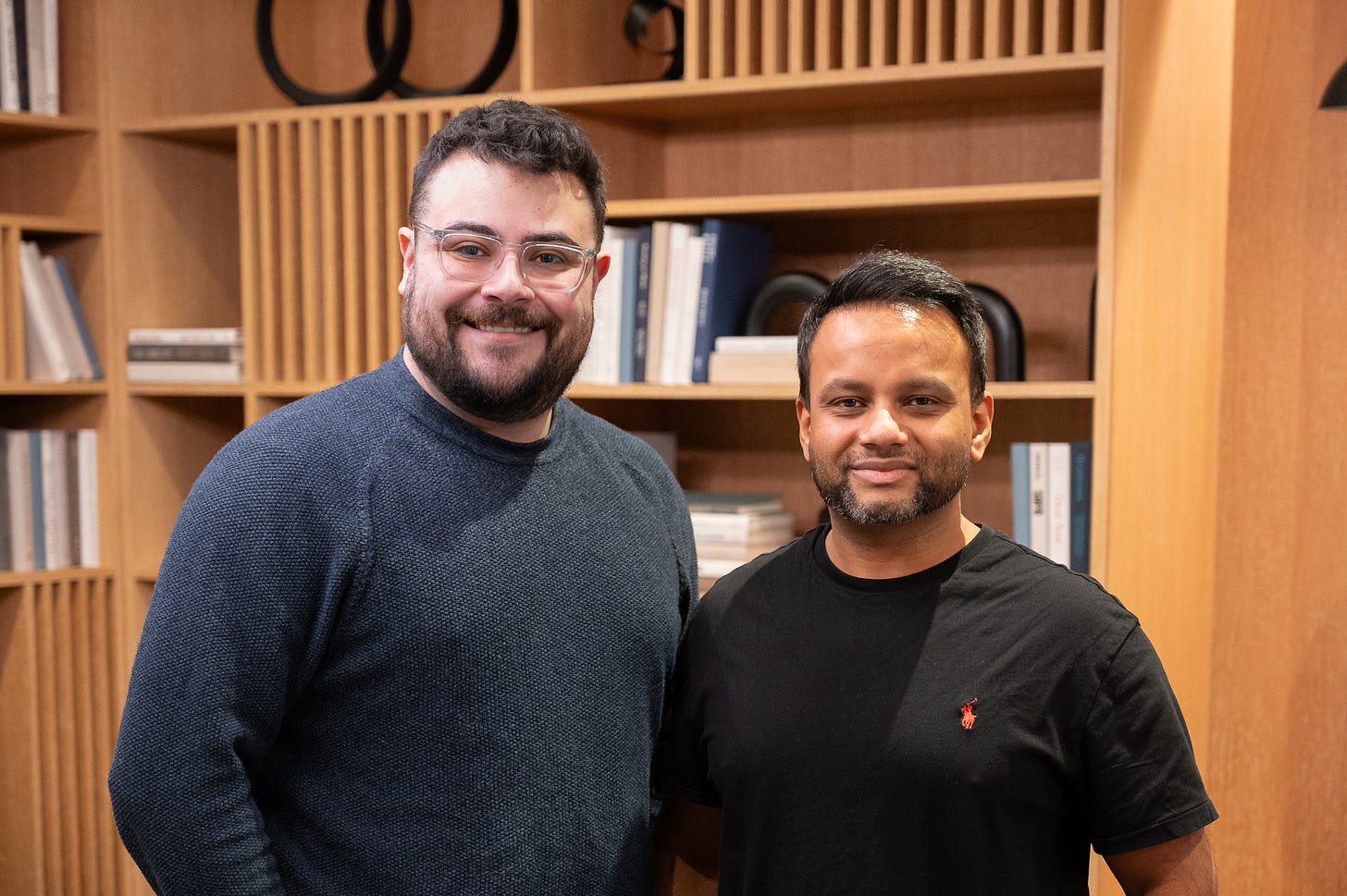You may be wondering: a Winter Newsletter in March? Isn’t March technically Spring? Alas, no. Upon emerging from his hole at Gobbler’s Knob on February 2, Punxsutawney Phil saw his shadow, forecasting six more weeks of winter.
Predicting the future is no easy feat — even for Phil, who has only one variable to contend with. For investors grappling with a whirlwind of new technologies and evolving ways of working, the challenge is greater still. We are fortunate to have more data to work with than the luddite Phil, more to inform our investment theses than simply ‘what happened last year’; at the same time, we would be foolish to ignore the past entirely. Previous technological paradigm shifts offer clues about the direction the world is going today amid the advent of horizontal AI.
Just look at your television (hat tip to my former colleague Brian Hirsch of Tribeca for this analogy). In the early days of TV, revenue was driven by the manufacturing of boxy vacuum tube sets, with companies like Zenith, RCA, and Sony at the forefront. But as the industry evolved, the true power shifted away from hardware to content ownership, data, and distribution — first through broadcast and cable networks, and later through streaming giants like Netflix and Prime Video. A similar transformation unfolded in the 2010s with the cloud revolution: rather than investing in their own hardware, companies turned to cloud platforms like AWS, Azure, and Google Cloud, outsourcing their computing needs and reshaping the economics of enterprise technology.
While it’s still early, we’re seeing the same type of transition emerge with AI. Initially, the focus is around hardware (GPUs, specialized chips, and data center infrastructure) and the core models themselves. These are the “TV sets” or “on-prem servers” of the AI world. But the long-term value is poised to accrue elsewhere: in the data that trains these models, in the orchestration and delivery of AI experiences, and in the layers that make AI accessible and ubiquitous.
Just as television hardware gave way to the broadcast and content giants and as bare-metal servers succumbed to cloud platforms, AI’s foundational “commodity” layer will almost certainly be overtaken by services. The winners will be those that own unique data sets, offer platforms for hosting and distributing AI-powered products, or create must-have AI applications that become the de facto user interface.
As in previous eras, the market will demand specialized solutions: AI specifically for healthcare, finance, manufacturing, etc. In the same way that cable eventually stratified into niche channels and streaming services carved out specific audiences, AI developers will build vertical solutions that deeply understand domain-specific language, context, and use cases. Owning such vertical expertise (and the corresponding user base) will create enduring competitive advantage.
Hence why Vertical AI is a core focus area for ASV III. Stay tuned on that front, as we’ll be hosting a Vertical AI-focused event in NYC in the Springtime.
On to the internal updates…
What’s New at ASV
This winter, Anthony Santaro was promoted to Vice President — congrats again, Anthony, on this much-deserved promotion.
With snow piled up across the Northeast, we’ve taken advantage of all the time indoors to get some writing done on a variety of topics. Somak Chattopadhyay published an article in the Syracuse Post-Standard outlining the ways in which AI is helping founders in smaller markets gather steam on their ideas, along with a reflection on the “Foie Gras Effect” here on Substack.
It’s been an eventful winter on the investment side as well. Our most recent checks written out of ASV III reflect the ways in which our thesis has evolved whilst still staying rooted in the core insights that shaped ASV I. The world has changed dramatically since we wrote our first check in 2015, but we retain our conviction that software companies transforming traditional industries are among the surest bets in the Wild West of the startup landscape. The fundamental change is in how these transformations are occurring, and two of our newest portfolio companies demonstrate the pivotal role new technologies are playing in driving enormous efficiencies and unlocking new possibilities.
BQP, based here in Upstate New York, applies quantum-inspired algorithms to turbocharge engineering simulations on high-performance computers. The platform allows engineers in mission-critical industries such as aerospace, energy, and heavy manufacturing to simulate designs more quickly, accurately, and cost-effectively. When building companies at the bleeding edge of the tech landscape, there’s always a risk of getting out over your skis, but as we got to know Abhishek Chopra and his cofounders, we were struck by their discipline, pragmatism, and obsessive focus with the present-day problems bedeviling their customers.
BQP’s value proposition is already formidable today, and the advent of quantum computing hardware promises to expedite their customers’ simulations by further orders of magnitude. The rapid pace of quantum computing advancements in recent months (see Microsoft’s recent release of its Majorana 1 chip) reinforces the importance of bridging the gap between today’s classical computing infrastructure and the quantum future. BQP is uniquely positioned to do so.
In the AI domain, we continue to assess a steady stream of compelling AI-powered vertical SaaS opportunities. AI startups are increasingly able to generate impressive traction at alarming speed, and while rapid growth is always an auspicious sign, it can also signal a lack of defensibility and differentiation. What’s to stop a copycat from enjoying similarly explosive growth? As such, the bar is incredibly high for AI founders. In recent months, we were fortunate to encounter a founder who not only sets a high bar for himself, but has literally passed the bar (as a former lawyer).
Enter Qumis, a Chicago-based builder of an AI copilot for insurance, founded by Dan Schuleman and Shiv Sinha. When assessing vertical AI solutions, we look for technologies that supercharge the productivity of human experts, and Qumis is a perfect embodiment of this strategy. The most impactful AI products are designed by the domain experts who have lived and breathed the industry’s pain points, and Dan’s deep experience as an insurance attorney ensures that Qumis is built with an insider’s understanding of where automation can drive the most meaningful efficiencies. Going forward, we’re on the lookout for similarly seasoned domain experts applying AI to their own industries. (Sound like someone you know? Give us a shout.)
We are still early in deploying ASV III, with the majority of the fund yet to be invested. We expect this to be an active year of new investments.
Company Updates
After announcing $3M+ in seed funding in January, BQP secured additional capital via a seed extension.
Compyl launched the Compyl Connect Partner Network, shoring up its partnership strategy as it continues to make waves in the cybersecurity space.
Larry Klein joined Machinery Partner as their new VP of Sales. Larry most recently served as Head of Global Enterprise Sales at Bringg, a market-leading delivery management platform.
Qumis raised a $2.2M pre-seed round, led by Armory Square Ventures.
Jobs
Compyl is looking to fill several hybrid roles spanning sales, product, design, and engineering.
Motive is hiring across a range of sales, finance, marketing, and engineering roles, predominantly in Seattle and Oklahoma City.
Qumis is hiring a Founding Account Executive in Chicago.
About ASV
Armory Square Ventures (ASV) is a venture capital firm based in the Finger Lakes region of New York State, with offices in NYC and Indianapolis. The firm was an early investor in ACV Auctions (NASDAQ:ACVA), Bentobox (acquired by Fiserv), and numerous other high-growth B2B Software companies.
We lead seed and early-stage rounds in B2B SaaS, marketplace, and vertical AI companies and play an active role recruiting talent, customers, and follow-on capital to help our companies scale.
We like to say we are an optimism engine for secondary cities and a community catalyst for regions outside Silicon Valley. As a firm, we are also enriched and nourished by individuals from a range of backgrounds, who are all passionate about uplifting and inspiring growth in cities across the Northeast and Midwest.
• Stage: Seed & Series A
• Location: Management based in New York State and/or other emerging cities across the US
• Check Size: $1M - $3M in the first round with plenty of reserves for follow-on capital
• Business Profile & Model: Software, mobile, or technology-enabled services (emphasis on B2B) with repeatable, recurring, or transaction-based revenue models
• Market: Addressable markets of at least $1B+
• Team: Full-time technical/product leader and sales/marketing leader
• Traction & Unit Economics: Prototype of product deployed with a small sample size of customers; capital efficient
We’re hard at work scouting new investments. If you or someone you know has startup questions, reach out to either Anthony or Preston (emails below). We are actively investing out of our third fund and look forward to sharing more on it as it continues to take shape.
Best wishes in the meantime.
The Armory Square Ventures Team
Get in Touch
Have an opportunity to discuss or want to talk startups?
Anthony Santaro - anthony@armorysv.com
Preston DeGarmo - preston@armorysv.com






